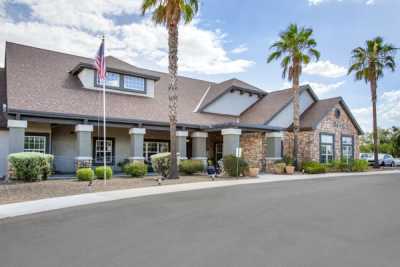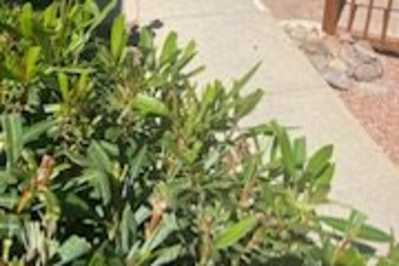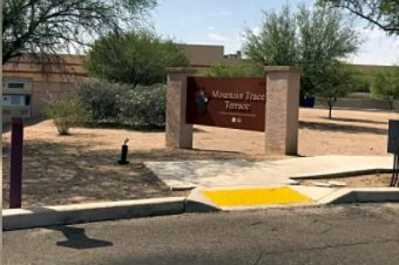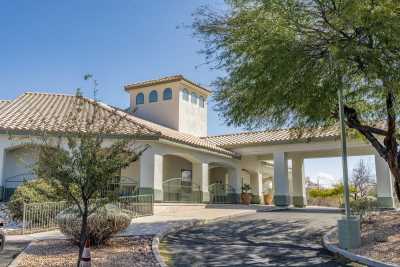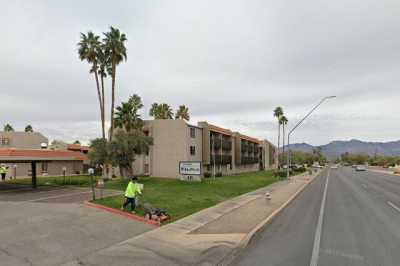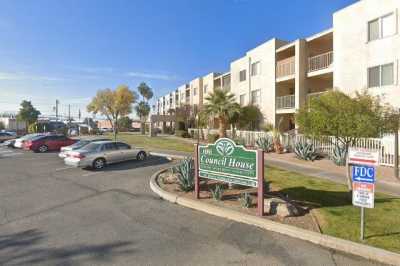
Best Senior Living Apartments in Tucson, AZ for 2025
Active seniors have flocked to Tucson in recent years. Its moderate cost of living, artistic culture, and unparalleled access to outdoor activities make Tucson a sweet spot for seniors looking for their next adventure. While this southern Arizona gem is smaller than other popular retirement cities like Phoenix or Dallas, its robust 55+ population is turning Tucson into the next big thing for senior living.
While A Place for Mom does partner with a few senior apartments, independent living communities in Tucson tend to reign supreme. Senior apartments are similar to independent living communities but usually offer fewer amenities and services. Learning about senior apartments in Tucson can help you make an informed decision about what’s best for you.
In this guide, you’ll find information about A Place for Mom’s partnering senior apartments in Tucson, Arizona. We get our information from our 20+ years of experience in Tucson’s senior living industry, our proprietary local data, and feedback from residents and families.
Read on to find an in-depth look at senior apartments in Tucson, Arizona. We cover everything you need to know to make an informed decision, including the average cost of senior apartments in Tucson, smart ways to pay, local laws and regulations, and what senior apartments in Tucson are like.
Senior Apartments Facilities near Tucson, AZ
The staff at Brookdale are warm, patient and accommodating. My Dad has been well cared for. The place smells great and is super clean every time I visit. The meals that I have enjoyed there with my Dad were...
Pay your rent on time, don't leave a mess for somebody else ie, pick up your dog poop. Don't be afraid to be friendly, you'll meet your neighbors coming and going. We are always happy to answer questions.
Everyone there is awesome. We should count ourselves fortunate that there are people in this world with the compassion to care for those who are unable to care for themselves. Special thanks to[names...
Our free advisors can help
- Compare local facilities
- Determine care type
- Schedule tours
- Evaluate pricing
Our methodology
How we rank order the Tucson community options above
We developed a proprietary recommendation system that orders Tucson community options based on factors we know are important to seniors and their families:
- Proximity to your search location
- Availability of recent, high-quality reviews
- The amount of detailed community information available
Where we source our information
14,000+ communities
We collect proprietary data from our network of 14,000+ senior living communities in the U.S., with regular refreshes of data and information
350,000+ reviews
We have 387,000+ reviews from senior living residents and family members that provide first-hand accounts about senior living communities
- Costs of senior apartments in Tucson, AZ
- What families are saying about senior apartments in Tucson
- Paying for your senior apartment in Tucson
- Understand Arizona laws and regulations for senior apartments
- What to expect from senior apartment living in Tucson
- Explore senior care with confidence
- Unfamiliar with Tucson? Highlights for seniors
Costs of senior apartments in Tucson, AZ
The average cost of a senior apartment in Tucson is $1,041 a month, according to A Place for Mom’s 2022 proprietary data.[01] Because senior apartments tend to have fewer amenities and almost no care services, they’re the most affordable senior living option. For example, independent living communities are the closest to senior apartments in terms of care services, and they cost $2,931 a month in Tucson on average.[01]
Senior apartments in Tucson have a similar cost structure to other apartment complexes. Residents pay a monthly rental fee that stays the same throughout the length of the lease, and they pay their utilities and other amenity fees separately. For instance, parking is often an additional monthly fee, as are trash services.
Tucson has a lower cost of living than nearby cities like Phoenix, which makes it a great place for seniors who want their money to go further. Seniors in Tucson also benefit from Arizona’s tax laws. Arizona doesn’t tax Social Security benefits and the state’s income tax rates are low, at 2.55% and 2.98%. Arizona also doesn’t have an inheritance or estate tax, which benefits seniors more than other groups.
The figures in the chart below reflect the average starting costs of senior apartments in Tucson before additional fees for utilities or amenities. These figures provide a cost comparison between Tucson and nearby communities and therefore don’t reflect the total cost of a senior apartment.
Average monthly cost of Senior Apartments in Tucson, AZ vs. nearby cities
Average monthly cost of Senior Apartments in Tucson, AZ vs. the state and national average
Average monthly cost of Senior Apartments in Tucson vs. other types of senior living
Median monthly costs of Senior Apartments in Tucson, AZ by room type
What families are saying about senior apartments in Tucson
Recent reviews for senior apartments in Tucson
Beehive Homes of Marana
The Lakes Apartments in Tucson, AZ
Brookdale East Tucson
Paying for your senior apartment in Tucson
Seniors in Tucson pay for their senior apartments in the same way they would pay for any apartment: using mostly private funds. Depending on their health and income, some seniors in Tucson may be able to access some funds from public resources like veterans benefits, Medicaid, and Medicare. These public means can help you afford health care or home care but won’t cover rent in a senior apartment. However, housing vouchers can help some seniors afford their apartment in Tucson.
Below, you’ll find tried-and-true advice for affording a senior apartment in Tucson. We include detailed information about how to pay for your senior apartment using private savings and public funds like veterans benefits, Medicaid, Medicare, and public housing assistance.
Most seniors use their retirement account or other personal savings to pay for their senior apartment. Arizona’s tax laws also keep senior living affordable for seniors, as the state doesn’t tax Social Security benefits or pensions and has lower income tax rates, at 2.55% and 2.98%.
Below are other resources to help you use your private funds to pay for your senior apartment in Tucson.
Nearly half of Arizona’s veterans are over 65, and Tucson has a solid veterans support network to accommodate these senior veterans. The Tucson Vet Center offers social services, while the Arizona Department of Veterans’ Services provides personalized benefits counseling.
While veterans benefits like the VA pension, the Aid and Attendance benefit, and the Housebound allowance may not cover the entire cost of a senior apartment, they can help keep senior apartments affordable for Tucson’s veterans.
Can I pay for my senior apartment in Tucson with my VA pension benefits?
Yes, veterans can use their VA pension to pay for their senior apartments in Tucson. The VA Pension program is a monthly allowance that veterans can use to pay for anything that improves their quality of life, and this includes housing. Surviving spouses may also be eligible for the pension.
To be eligible for the VA Pension, veterans must meet the following criteria:
- Have an honorable discharge
- Service at least 90 days of active duty, with at least one day during wartime
- Meet low-income status
- Be 65+ or disabled
Can I pay for my senior apartment in Tucson with the Aid and Attendance benefit?
Yes, veterans can use the Aid and Attendance benefit to pay for their senior apartment in Tucson. The Aid and Attendance benefit functions in the same way as the VA Pension and can also be used to pay for anything that improves the veteran’s quality of life.
The Aid and Attendance benefit can sometimes cover much more than the VA Pension. Veterans are eligible for the Aid and Attendance benefit if they have a mental or physical disability, and if they meet at least one of the following criteria:
- Have very limited eyesight
- Are bedbound without treatment
- Need assistance with some activities of daily living, like mobility or meal preparation
- Already live in a nursing home or an assisted living facility
Can I pay for my senior apartment in Tucson with a Housebound allowance?
No, the Housebound allowance won’t cover rent for a senior apartment because it can only be used to pay for home health care. The Housebound allowance is for senior veterans with an age-related disability that prevents them from easily leaving their homes. Veterans can’t receive both the Aid and Attendance benefit and the Housebound benefit.
Veterans benefits counseling and advocacy in Tucson
Many veterans struggle to access their benefits, even if they’re eligible. To help, multiple advocacy groups, local organizations like Veterans of Foreign Wars (VFW) and Disabled American Veterans (DAV) chapters along with state agencies have sprung up to counsel veterans through the application process.
Most veterans in Tucson choose to get benefits counseling through the Arizona Department of Veterans’ Services (ADVS). The ADVS employs Veterans Benefits Counselors who can walk with you through the entire application process, either virtually or in person.
VFW Post 549 is another option for veterans to access benefits counseling. As one of the largest VFW posts in the nation, VFW Post 549 is an excellent resource for both veterans and their families. VFW Post 549 can even appeal decisions on behalf of veterans. Tucson’s DAV chapter is an advocate for local veterans in need of assistance, especially disabled veterans. DAV also offers benefits counseling.
The Tucson Vet Center provides social services for local veterans, including a comprehensive counseling program for veterans and their families. The Tucson Vet Center also organizes social and volunteer events to help veterans connect with one another.
Approximately 14,877 veterans live in Tucson, according to the U.S. Census Bureau.
About 43% of Tucson’s veterans are over 65, according to the U.S. Census Bureau.
Resources for Tucson veterans
Arizona Department of Veterans’ Services
3839 N. Third St.
Phoenix, AZ 85012
Phone: 602-255-3373
Veteran Benefits Counselors (VBCs)
Tucson Vet Center
2525 E. Broadway Blvd., Suite 100
Tucson, AZ 85716
Phone: 520-882-0333
Counseling services
Other services
Veterans of Foreign Wars (VFW) Post 549
8424 Old Spanish Trail
Tucson, AZ 85710
Phone: 520-790-4626
Email: vfwpost549@gmail.com
Disabled Veterans of America (DAV) Chapter 4
4145 W. Ina Road, Suite 131
Tucson, AZ 85741
Phone: 520-791-9067
Email: chapter4@davchapter4tucson.org
Neither Medicaid nor Medicare will cover the rent in a senior apartment because both are health insurance programs and not housing assistance programs. That said, it’s still important know how Arizona’s Medicaid program and the federal Medicare program can help offset some of your health expenses.
AHCCCS: Arizona’s state Medicaid program
Arizona’s Medicaid program is called the Arizona Health Care Cost Containment System (AHCCCS) and is one of the most generous Medicaid programs in the country. Broadly speaking, AHCCCS covers more services for more people than Medicaid programs in other states.
Like all Medicaid programs, AHCCCS is specifically for low-income people without health insurance. In Arizona, to be eligible for AHCCCS, an individual can make no more than $1,133 a month in pretax income, and couples can make no more than $1,526 a month. AHCCCS covers most health-related expenses, including the following services:
- Hospital care
- Dental, vision, and hearing care
- Dialysis
- Specialist care (like ophthalmology)
- Labs and X-rays
- Injections and immunizations
- Emergency medicine care
ALTCS: Arizona’s Medicaid program for long-term care
Healthy, active seniors are not eligible for Arizona’s Medicaid subprogram for long-term care, called the Arizona Long Term Care System (ALTCS). However, Arizona seniors should be aware that ALTCS often covers care and rent in an assisted living facility or nursing home, and that the income cutoff for ALTCS is much higher than for AHCCCS.
Because ALTCS is so generous, you should apply for ALTCS as soon as or even before you start needing an assisted-living level of care, even if you’re unsure whether you’re eligible.
Medicare: A federal health care program
Medicare is a federal health care program specifically for seniors. To be eligible for Medicare, you need to be over 65 and have paid Medicare taxes (or be married to someone who has). Like Medicaid, Medicare will not cover rent in your senior apartment, but it will cover short-term and medically necessary health care.
Arizona’s Medicaid Program (AHCCCS) has a subprogram that helps low-income seniors pay their Medicare premiums. This program is called Help with Paying for Medicare Costs Only, and its income cutoffs are the same as the income cutoffs for AHCCCS.
What does “short term” mean for Medicare?
Medicare will cover 100% of your medically necessary health care expenses for up to 20 days in a hospital or rehabilitation setting. From days 21-100, Medicare will pay some of the expenses, and you will pay a daily copay. Medicare may also cover some frequent and recurring procedures and medications, like dialysis and blood pressure medications.
What does “medically necessary” mean for Medicare?
What Medicare considers medically necessary depends on the individual. What is medically necessary for one person may not be for another. A doctor needs to establish that a procedure, medication, or treatment is medically necessary for the patient before Medicare will cover it. To get an idea of what Medicare covers, you can search for individual medications, items, or tests on the Medicare coverage portal.
Who can help me with my Medicaid and Medicare benefits?
The Pima Counsel on Aging is Tucson’s local advocacy group for seniors. It offers benefits counseling and education with Arizona’s State Health Insurance Assistance Program (SHIP) Program. Tucson’s Medicaid and Medicare offices can also field your questions about coverage. The Arizona Ombudsman can take any complaints you may have about Arizona’s Medicaid program, and they’ll either help solve your problem or connect you to someone who can.
Tucson resident Medicaid and Medicare resources
Arizona Health Care Cost Containment System (AHCCCS)
801 E. Jefferson St.
Phoenix, AZ 85034
AHCCCS Phone: 602-417-4000
ALTCS Phone: 888-621-6880
Apply for AHCCCS
Tucson Medicaid office
316 W. Fort Lowell Road
Tucson, AZ 85705
Phone: 520-638-2270
SSA office – Tucson South
88 W. 38th St.
Tucson, AZ 85713
Phone: 800-772-1213
Pima Council on Aging (PCOA)
8467 E. Broadway St.
Tucson, AZ 85710
Phone: 520-790-7262
PCOA – ways we help
Some seniors in Tucson may find they need extra assistance with housing, meals, or employment. Thankfully, Tucson has well-established and compassionate help available to seniors in need. Learn how to access Tucson’s housing assistance programs, food assistance, and more.
Section 8 housing assistance in Tucson
Section 8, now called the Housing Choice Voucher (HCV), is a program that helps individuals afford their monthly rent, and it’s funded by the U.S. Department of Housing and Urban Development (HUD). The income cutoff varies depending on location, but in Tucson the income cutoff to be eligible for Section 8 housing is $3,579 a month before taxes.
While this is the income cutoff, the government requires most Section 8 Housing Choice Vouchers to be reserved for people who make under $2,381 a month before taxes. This means you’re far more likely to get approved for HCV in Tucson if you make less than $28,580 a year.
If you’re using a Section 8 Housing Choice Voucher, your rent will never be more than 30% of your total monthly income. This means that in Tucson, the most you will ever pay for rent with a Section 8 Housing Voucher is $1,073 a month. The chart below outlines what you’ll pay in rent in a Section 8 apartment in Tucson, Arizona.
Food assistance in Tucson
Tucson seniors have access to two local food assistance programs. The first is the Senior Meal Program developed by Tucson’s Senior Centers and Catholic Social Services. From Monday through Friday, seniors can get one wholesome and tasty meal a day for no cost.
To sign up for this program, seniors should call their preferred senior center to learn when to pick up their meal. You can find a list of participating senior centers with their contact information on the Senior Meals Program brochure.
The Pima Council on Aging (PCOA) offers another meals program for homebound seniors or people with disabilities. Seniors or their families can arrange to get receive one meal a day, delivered hot and ready directly to your home. Seniors need to go through an in-home evaluation before they’re deemed eligible for the PCOA meals program. You can set up this in-home interview by calling 520-790-7262 or emailing help@pcoa.org.
More Social Security benefits
Social Security benefits include more than Medicare. In fact, you can use Social Security benefits to pay for anything you need, including housing. To be eligible for Social Security benefits, you need to meet the work credit requirements or other eligibility factors, like an inability to work because of a disability, or the loss of a spouse. You can discover what Social Security benefits you’re eligible for by taking the Eligibility Quiz on the Social Security website.
You may be eligible for one or more of the following programs:
- Social Security Retirement (SSR) benefit. Most seniors are eligible to apply for this benefit between the ages of 62 and 70. But be warned: After age 70, you can no longer apply for this benefit. You should be eligible if you paid Social Security taxes for more than 10 years.
- Social Security Disability Insurance (SSDI). This benefit is particularly for people who have paid Social Security taxes and are disabled.
- Supplemental Security Income (SSI). This benefit is additional financial assistance added to other Social Security benefits, like the SSDI or SSR benefits. It’s meant to help people with disability or blindness.
- Social Security Survivor’s pension. This benefit is for widows or widowers who were married to workers who paid Social Security taxes.
Tucson resident public assistance resources
Tucson Housing and Community Development Department
310 N. Commerce Park Loop
Tucson, AZ 85745
Phone: 520-791-4171
Email: HCDAdmin@tucsonaz.gov
Understand Arizona laws and regulations for senior apartments
Senior apartments are regulated in the same way as other apartment complexes. Assisted living, nursing homes, or memory care are licensed through the Arizona Department of Health because they offer personal and medical care services. But because senior apartments don’t offer any care services, they’re only required to follow the same laws and regulations as any other apartment complex.
Requirements specific to Tucson’s senior apartments
In fact, senior apartments often have the opposite eligibility requirements than assisted living communities, requiring tenants to be in good health. Senior apartments in Tucson also require tenants to be over 55, or in some cases 64. However, this does not mean that every single resident of a senior apartment in Tucson must be over 55 or 64. Some senior apartments allow younger residents if they live with a senior.[01]
While senior apartments don’t provide personal or medical care, residents of senior apartments in Tucson can, and often do, receive home health care from an independent care provider. This care isn’t coordinated by the apartment complex, and the senior or the family members take on full responsibility for any damages to the apartment caused by the caregiver.
What are the regulations for senior apartments in Tucson?
In Tucson, senior apartments are required to follow the same basic regulations as other apartment complexes. These include the following regulations for landlords:
- Keep the apartment in a safe and livable condition
- Provide sufficient hot water
- Supply heat in the winter and air conditioning in the summer
- Offer extermination services and waste removal services
- Provide a security system, like a key
Residents of Tucson’s senior apartments should keep the apartment clean and not knowingly destroy the property. Residents are also expected to do the following:
- Follow all community rules, such as quiet hours and guest policies
- Not alter the residence (like painting) without permission
- Pay monthly rent and fees on time
Arizona outlines the state’s renters and landlord rights in the Arizona Residential Landlord and Tenant Act. But tenants of Tucson senior apartments should be aware that Arizona has no government agency to handle disputes between a resident and a community. So be sure to read the community guidelines and your contract carefully before moving in to be aware of rules and contractual obligations.
COVID-19 regulations for Tucson senior apartments
Senior apartments in Tucson follow federal and local guidelines to prevent the spread of COVID-19. Unlike assisted living communities or nursing homes, senior apartment don’t have any special masking or quarantine rules.
Pima County posts 15-day case maps and local vaccine rates on the Pima County COVID-19 Data Reports page. You can find case numbers and vaccine rates for your neighborhood by exploring the map.
What to expect from senior apartment living in Tucson
Tucson is becoming a popular destination for active seniors looking for their next adventure. For many seniors, the city’s features come as a pleasant surprise. Few places offer million-dollar views, world-class cultural activities, and a well-connected senior support network for such a low price tag. In fact, Tucson is one of the most affordable places for a senior to retire in the United States, beating out cities like Phoenix, Denver, and Dallas.
Because Tucson is a hiking hot spot, many seniors look to retire here well before they need assisted living. Senior apartments are a great option for these active adults, because they offer community building and amenities without care services.
In Tucson, independent living communities are far more common than senior apartments and offer some similar basic benefits, including freedom from many of the responsibilities of home ownership. However, A Place for Mom does partner with some senior apartments in Tucson, and these tend to be considerably cheaper than independent living communities. Learn how Tucson’s senior apartments can take you on your next adventure.
Lifestyle: Tucson’s senior apartments
Tucson’s senior apartments resemble other apartment complexes in Tucson. Most have over 50 residents living in one- or two-bedroom apartments. You can expect your Tucson senior apartment to have amenities like a fitness center, a pool, and a club house for social events. Some even have amenities like an in-house spa and a dog park.
Senior apartments in Tucson are designed with seniors in mind. Wheelchair ramps, elevators, and accessible cabinetry are the norm. Seniors can expect on-call maintenance to fix any appliances, and all senior apartments have security staff.
Because Tucson is a smaller city surrounded by preserved natural areas, senior apartments tend to be on larger plots with nice views. Some have walking paths or are near hiking trails. While they don’t have the same level of amenities or activity schedules as independent living communities, our partnering senior apartments have grassroots activity programs. Community newsletters, birding clubs, and regular social events are common. And if the community doesn’t offer your favorite activity, you can start your own club!
Payment structure: Tucson’s senior apartments
Senior apartments are the cheapest living option for seniors in Tucson in part because many accept Section 8 Housing Choice Vouchers. Tenants pay rent monthly, and, in most cases, utilities are paid separately. That said, a few apartments do include some utilities in the monthly fee (often Wi-Fi). Unlike other apartment complexes that often charge an entire month’s rent as a deposit, senior apartments in Tucson usually charge no more than $300 for a deposit.
Tucson supports all seniors
The Pima Council on Aging (PCOA) is a robust senior advocacy group based in Tucson, and it’s helped make Tucson a supportive place for all seniors. Seniors can access reliable benefits counseling for Medicaid, Medicare, and other Social Security benefits. The PCOA also provides meals to seniors in need and can help connect you to eviction prevention programs, transportation, free classes, and more.
Tucson itself is an approachable city for many seniors who tire of the concrete jungle and busy intersections of large cities. While it does have urban areas, much of the city is suburban, and the wide open spaces and nature walks are less than a 15-minute drive from just about any location in town.
Senior apartments in Green Valley
Green Valley, an unincorporated community featuring a collection of senior-friendly subdivisions, is one of the most comfortable places to retire in the United States — and it’s only 30 minutes south of Tucson. About 80% of Green Valley’s population is over 65, but it’s much larger than most other retirement communities.[02] With 22,000 residents, Green Valley has its own economy, hospital systems, parks, and schools. It’s quiet and safe enough that plenty of people drive golf carts instead of cars.
Due to the high senior population, Green Valley has as many, if not more, senior apartment options than Tucson. Seniors in Green Valley can also rest assured that they’ll be able to find great assisted living or memory care as their needs change.
Explore senior care with confidence
Know where to start.
Identify the right care for your loved one with our free assessment.

See what you can afford.
Understand cost and payment for long-term care based on your loved one's needs.

Find top facilities for you.
Free, personalized guidance from our Senior Living Advisors can help you narrow your search.

Tour your favorite facilities.
Our free touring checklist can help you choose the right community.
Unfamiliar with Tucson? Highlights for seniors
Approximately 82,580 seniors over 65 currently live in Tucson, Arizona, according to the U.S. Census Bureau.
According to the U.S. Census Bureau, the average household income for people over 65 in Tucson is $53,285 a year.
Health care for seniors in Tucson
For a city of around 500,000 people, Tucson has an excellent health care system. This is due, in part, to the University of Arizona’s ability to bring in local talent. The high number of seniors in Tucson also lends itself to a robust health care system.

TMC Healthcare — Tucson
According to U.S. News and World Report, TMC is the best hospital in Tucson and is one of the best hospitals in Arizona. It’s especially high performing in geriatrics and cardiology procedures.
5301 E. Grant Rd.
Tucson, AZ 85712
Phone: 520-327-5461
Find a provider

Northwest Medical Center (NMC) — Tucson
This moderately sized hospital is one of the best in Tucson. According to U.S. News and World Report, NMC has good outcomes for its procedures. It’s highly rated for seven different procedures, including prostate cancer surgery, heart attack care, and geriatrics.
6200 N. La Cholla Blvd.
Tucson, AZ 85741
Phone: 520-742-9000
Find a provider

Banner – University Medical Center South
Banner – University Medical Center South is a nonprofit research hospital on the University of Arizona’s campus. This hospital provides compassionate, competent care and is highly rated for cancer procedures, cardiology, and geriatrics, among other specialties.
2800 E. Ajo Way
Tucson, AZ 85713
Phone: 520-874-2000
Find a provider

Carondelet St. Joseph’s Hospital
Carondelet St. Joseph’s Hospital is a for-profit, private hospital with almost 500 beds. It offers specialty care, such as ophthalmology, neurosurgery, and acute care, as well as general in-patient hospital care.
350 N. Wilmont Road
Tucson, AZ 85711
Phone: 520-873-3000
Find a provider
Transportation for seniors in Tucson
Like most Western U.S. locales, Tucson is a driving city. Most people get around using a car, and senior apartments in Tucson don’t typically offer transportation for residents. However, all of our senior apartments in Tucson do provide covered parking.
For seniors without a car, Tucson does offer some public transportation through the Sun Tran System, which has a bus service, a shuttle, and vans for disabled individuals. It’s considered a senior-friendly source of public transportation because it has senior-specific seats directly behind the driver and lifts for people with limited mobility.
The Sun Tran system also offers a class to teach seniors how to use this service. Seniors can sign up for this class by calling 520-206-8881 or by going to the senior page of the Sun Tran website.
Walkscore.com rates cities based on their walkability, bike-friendliness, and public transportation. Tucson received the following scores, each out of 100:

Walk Score

Transit Score

Bike Score

Senior activities in Tucson
There’s no shortage of activities for seniors in Tucson, and most take place in the great outdoors. Whether you want watch the sunset from Saguaro National Park, try some of the best Mexican food in the United States, or attend a production in an Old West theater, Tucson can deliver.
Explore the Sonoran Desert Museum
Tucson is set in the heart of the Sonoran Desert, which stretches throughout the Southwest. The Sonoran Desert Museum is the best place to learn about Tucson’s vibrant natural surroundings. The museum is mostly outdoors and includes over 98 acres of pristine desert landscape. On especially hot days, you can go inside in the museum’s art gallery, gift shop, and museum of natural history.
Seniors enjoy discounted admissions, and most of the museum — including the outdoor areas — is wheelchair accessible. Visitors can rent wheelchairs at the museum for a small fee, and the museum can arrange special tours that accommodate visitors with visual or hearing impairments.
Hike in Saguaro National Park
Tucson is one of the only cities surrounded by a national park. Saguaro National Park hugs three sides of Tucson, which means it’s incredibly easy to get out and enjoy the park’s natural beauty.
Named for the massive cacti that grow in abundance throughout the park, Saguaro National Park is a great destination for hikers of all levels. The Signal Hill hiking trail will take intrepid explorers to ancient petroglyphs from the Hohokam people. For seniors who’d rather stay in the car, the Cactus Forest Drive takes visitors through the most scenic parts of the park and is an especially good way to see one of Tucson’s famous purple sunsets.
Saguaro National Park is also one of the top areas to experience the starry sky. As a Dark Sky Zone, it has low levels light pollution and skies are often clear, which means it’s possible to see the Milky Way almost every night. Outside of the park, the Loews Ventana Canyon Resort throws stargazing parties, and the Steward Observatory from the University of Arizona offers educational events.
Dive into Southwest culture
The Gaslight Theater is a local mainstay for its family-friendly and affordable productions. In an old-timey saloon setting, visitors enjoy nightly performances of classic and contemporary shows. Many of Tucson’s local senior centers arrange visits to the Gaslight Theater at least once a year. You get free popcorn with your ticket, and meals are available to purchase.
The Pima Air and Space Museum is one of Tucson’s main attractions. With over 400 rare and significant aircraft, it’s especially popular with local veterans, and seniors get discounted admission. Visitors can explore WWII planes and presidential aircrafts or dive into the experience with a flight simulator. It’s a large museum set mostly outside on a multi-acre field, so tram tours are available every day to drive visitors through the airplanes and helicopters.
Tucson has a fascinating history as one of the only cities in the United States that has been under the control of Spain, Mexico, the Confederacy, and the United States. Mission San Xavier del Bac is part of this storied past, having been built by Spanish missionaries in the 1700s, and it now sits on land managed by the Tohono O’odham Nation. This historic church is free to visit and makes a great afternoon trip just outside the city.
Enjoy Tucson’s senior centers
Tucson has exceptional senior programs, and new residents should get their Senior Activity Card as soon as possible. It costs a small fee but provides free access to all of the senior centers’ activities, classes, and events for the year. Almost all of Tucson’s senior centers have a full kitchen, a game room, a gym, and computer access.
Senior center activities change every week, but some common activities include yoga or tai chi, social hours, and beginner Spanish classes. The senior centers also put on a yearly Senior Olympic Day. Sign up with friends to participate in the horseshoe toss, leisure walking, or archery, or you can cheer on from the sidelines. You can sign up on the Senior Olympic homepage during the enrollment period.
Participate in top-notch culinary traditions
It would be remiss to talk about Tucson without mentioning its long and storied culinary culture. Tucson was UNESCO’s very first City of Gastronomy named in the United States. It received this title because of its concentration of exceptional restaurants that carry on historical culinary traditions rooted in the desert landscape. You can find official restaurants and information about Tucson’s culinary past on Tucson’s City of Gastronomy website.
Frequently Asked Questions
Brookdale East Tucson, The Lakes Apartments and Beehive Homes of Marana are the top-rated Senior Apartments facilities near Tucson, AZ. These Senior Apartments facilities received the highest rankings based on verified family reviews. See full list of communities.
The average cost of Senior Apartments in Tucson is $2,002 per month. This cost may vary based on location, amenities, floorplan, level of care and other factors.
References
A Place for Mom. (2023). A Place for Mom proprietary data.
United States Census Bureau. (2021). Age and sex (S0101): Green Valley CDP [Data set]. American Community Survey.
United States Census Bureau. (2021). Veteran status (S2101): Tucson city [Data set]. American Community Survey.
United States Census Bureau. (2021). Age and sex (S0101): Tucson city [Data set]. American Community Survey.
United States Census Bureau. (2021). Age of householder by household income in the past 12 months (B19037): Tucson city [Data set]. American Community Survey.

More questions?
Ask an A Place for Mom local advisor at no cost.
- Green Valley, Arizona
- Oro Valley, Arizona
- Sahuarita, Arizona
- Vail, Arizona
- Oracle Foothills Estates, Arizona
- East Sahuarita, Arizona
- Loma Linda, Arizona
- Tanque Verde, Arizona
- Valley View, Arizona
- Civano, Arizona
- Rillito, Arizona
- Rincon Valley, Arizona
- Valencia West, Arizona
- Tucson Estates, Arizona
- Orange Grove Estates, Arizona
- Casas Adobes, Arizona
- Corona de Tucson, Arizona
- Old Tucson, Arizona
- Tucson National Estates, Arizona
- San Xavier, Arizona


